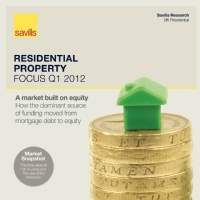It could be said that there is very little in global financial markets that can’t be understood in the context of a surfeit of savings in the eastern hemisphere and a surfeit of debt in the West and the ongoing re-balancing that is needed between the two.
This is reflected in real estate markets too; housing markets have been growing much faster in the equity-rich eastern hemisphere.
In the UK, as in much of the western hemisphere, mainstream residential property transaction levels remain mired at an all time low as the debt drought continues and activity is confined to the markets that can, and do, attract buyers with equity. This means that purchases are highly discretionary.
There has been a ‘flight to quality’ as buyers want the best properties: the most fashionable, the most accessible, the most prestigious and the best performing. This is the ‘prime era’ and one where grade A stock has outperformed.
A wealth preserver
Real estate, particularly in world cities like London, has developed a status of a ‘wealth preserver’.
London’s ‘safe haven’ status is constantly referenced in explanation of substantially increased values. When real estate is being used as a store of wealth like this, its income-producing qualities are of as little importance as that of gold in a bank vault.
Net yields may be seen as simply offsetting holding costs (arguably putting it at an advantage against costly-to-store gold) but not all equity investors are so oblivious of income. The task of many other global equity investors is to seek stable income streams over the medium and long-term.
This seems to be something that the UK property industry has been slow to realise and adapt to. The valuation of residential property is still predicated on the old-world, mortgage-funded, owner-occupied model.
The few investment portfolios available are still being appraised at a discount to open market, vacant possession value.
If UK housing (development, investment and owner-occupation) is to attract new forms of funding, as it must in the new age of debt drought, we have to understand equity and the cash it can generate.
Cash-flow is King
Our analysis of Britain’s housing value shows overall debt levels of only 29%. It is already a market rich in equity – but this has debarred entry to those with little or no equity to use as deposit.
Little wonder that demand for rental property is growing very fast indeed. More worrying perhaps is the poor prospects for this demand to be met.
As investor portfolio ownership implies an immediate discount, it is no wonder so many potential large-scale landlords and housing providers are still waiting to enter the sector.
In future, it will be more important, we think, to understand net cash flows and their appeal to a global equity provider.
It is these cash flows that will increasingly determine value outside the wealth preservation zones.
The residential property industry must understand that, in the new age of global equity, cash flow is King.

.jpg)
.jpg)
.jpg)
.jpg)